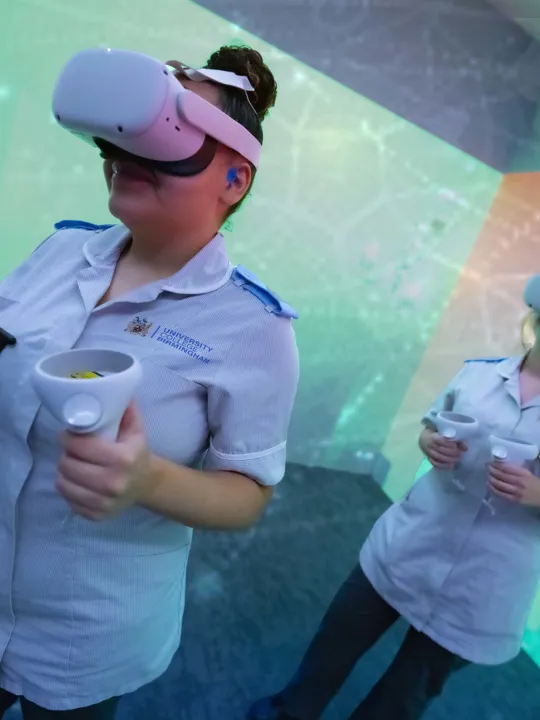July 2025
University’s “future-ready” health education to drive delivery of new 10-year NHS Plan
By Melanie Hall
Share post:Read time: approx 4 mins
University College Birmingham’s new learning and teaching strategy is set to play a critical role in meeting the ambitions of the new 'fit for the future' 10-year NHS Plan, launched to transform the health and care workforce over the next decade.
University College Birmingham’s bold, strategic focus on personalised learning, sustainability, collaboration and career-readiness puts it in a strong position to meet the region’s growing health and care demands - and support workforce innovation, nationally.
Professor Gill Brown, Pro-Vice-Chancellor and Executive Dean for the School of Health, Life Sciences and Education, said: “Through flexible, modular programmes, inclusive entry routes and increased use of blended learning, students from all backgrounds - including mature learners and those entering through vocational routes - will be able to chart tailored pathways into clinical, allied health and social care roles.
“Crucially, we are designing programmes that reflect the real lives of learners, meaning more flexibility, more support and more ways to progress into meaningful NHS careers.
“Recently picking up the Student Nursing Times’ 2025 Best Education Provider award, our commitment to personalised learning will be instrumental in opening up and diversifying access to NHS careers.”

-
Championing sustainable health education
The 'fit for the future' plan calls for a long-term approach to workforce wellbeing, retention and community impact and University College Birmingham’s focus on sustainability ensures students are prepared to practise in a system underpinned by prevention, equity and resilience.
Health courses are being designed with an emphasis on population health, climate-conscious care and long-term retention - supporting both personal wellbeing and systemic change.
-
Building collaborative, future-focused education
The University’s collaborative and future-focused strategy directly aligns with the NHS’s vision of integrated, multidisciplinary care. The University is deepening its partnerships with NHS Trusts, Integrated Care Systems (ICSs) and primary and community care providers to co-create relevant, localised curricula.
Future-facing skills such as digital literacy, AI in health, virtual care and data-informed decision-making are being embedded across the curriculum, ensuring graduates are ready for the evolving healthcare landscape.
Interprofessional education and clinical simulation will also play a growing role in helping students train together, reflect real-world team-based care, and better prepare for integrated practice settings.

-
Enabling a career-ready health workforce
With the NHS focused on building a larger, more resilient and better-supported workforce, the University is prioritising career-readiness at every stage of the student journey, from employer-informed curricula and expanded placement opportunities to leadership training and routes into advanced clinical practice.
Professor Helen Poole, Senior Pro-Vice-Chancellor, said: “We’re not just preparing students for jobs, we’re preparing them for lifelong, impactful careers in health and care.
“Our cutting-edge simulation and immersive learning spaces are accelerating clinical readiness, expanding training capacity and directly delivering on the need to build a future-ready healthcare workforce."
-
Delivering impact through education
University College Birmingham’s contribution to the 10-year NHS Plan is underpinned by a commitment to evidence-based practice, continuous improvement, and regional impact.
By embedding its Learning and Teaching Strategy across healthcare education, the University is ensuring its graduates - and its teaching - make a meaningful contribution to the transformation of the UK health and care system.
Explore our departments and courses supporting the 10-year NHS Plan:
Check out our latest news stories

Chelmsley Starters and Bluebell Wood officially opened by Saqib Bhatti MP
Saqib Bhatti MP joins other guests and VIPs at the official opening event for the Chelmsley Starters culinary school…
Read more
Contextual admissions – your personal path to progress
University College Birmingham launches it's contextual offers scheme, widening participation for under-represented students.
Read more
Business students travel to infinity in Global Entrepreneurship Week conference
The theme of this year's student learning conference could scarcely have been more relevant.
Read more
Chelmsley Wood's Bluebell Wood eatery welcomes high-profile visitors
Bluebell Wood welcomes high-profile guests and the highest environmental health rating of 5.
Read more
University’s Guild of Students officers add their voice to national debate
UCB Guild of Students join a national debate on the post-16 white paper.
Read more
'Bear' ing the brunt of blisters! The Children in Need Thousand Mile Challenge
University College Birmingham students lend their support to the Children in Need Thousand Mile Challenge
Read more